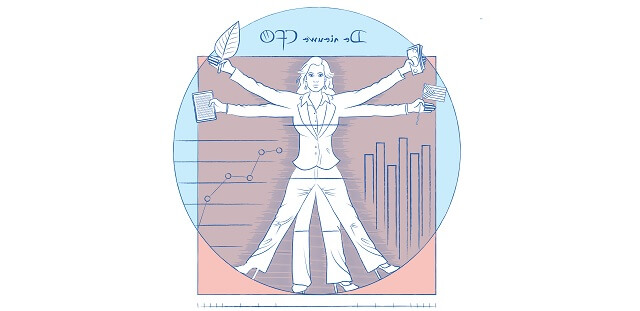CFO, Seize Your Role as Catalyst and Strategist

Author: Hayat Douich & Pieter Hofman | Image: Ricky Booms | 27-06-2023
CFO Annemiek van Melick of insurer NN rightly observes elsewhere in this magazine, ‘The role of the CFO is broadening, from pure financial steering and reporting to measuring and monitoring non-financial targets, such as the net zero ambition or male-female ratios.’
> See also: Annemiek van Melick: ‘You Cannot Satisfy All Stakeholders All The Time’
Strategy, risk, compliance, sustainability, innovation, and digitalization are just some of the topics on the CFO's agenda today. A modern CFO can (or rather, must) fulfill four roles: that of strategist, implementer, steward, and catalyst.
> See also: 'The CFO: strategist, implementer, steward or catalyst?
From steward to strategist
Traditionally, the CFO devotes attention and energy primarily to the role of executor and steward. The focus is on being compliant and on mandatory reporting. This is reinforced by the enormous pressure on new reporting requirements such as the Corporate Sustainability Reporting Directive (CSRD). The broadening of the function means that the roles of catalyst and strategist also become increasingly important. As catalyst, the CFO influences behavior within the organization: he or she ensures that compliance is widely supported and that organizational goals are achieved. As strategist, there is more looking ahead. With this the CFO plays a supporting and advisory role with an eye to long-term goals and organizational change.
The need for broadening stems mostly from a number of ‘external factors’ that affect the CFO and the organization. First, these are the economic as well as the social context. The CFO too has to deal with the relatively large uncertainty of macro-economic and geopolitical factors: the consequences of pandemics and war, looming recession, rising interest rates, rising inflation, high energy prices, a (looming) new banking crisis, a tight labor market. Society and politics are also changing markedly and with increasing frequency. Public opinion forces companies to take firm action. The government and politicians are making demands in areas such as ESG criteria. Companies are expected to assume their social responsibility, for example in the field of (financial) health or sustainability.
The more digital, the more the CFO comes into his or her own
The field of digitalization presents valuable opportunities as well as significant risks. Digitization and artificial intelligence (AI) offer organizations enormous possibilities in terms of cost savings and efficiency. And more importantly, they offer possibilities for new and promising business models. To better harness the benefits of digitization and manage the risks involved, it is necessary to get the basics right. The CFO function is inherently data-intensive but has made fewer strides to leverage data and technology compared to the business. This is unfortunate because the more digital the organization is, the greater the role the CFO can play as a catalyst and strategist. According to the Deloitte CFO Survey Spring 2023 most CFOs perceive their organization's digital maturity as underwhelming. 80 percent of CFOs call that maturity moderate at best. This creates a discrepancy between the broadening role and the reality (which is more in line with the traditional role).
5 focal points for the CFO
Internally, expectations about what a CFO should offer an organization are also increasing. It appears from the Deloitte's Survey on CFO Perspective for 2025 that the CFO is expected to provide support and advice on strategic and organization-wide issues. CFOs are cautiously trying to take the first steps in these areas, but most often this is not (yet) structured.
To fulfill all the aspirations and expectations, the CFO will need to engage concretely with a number of important points:
- Monitoring the room for maneuver and providing insight into the consequences of the choices to be made and the trade-offs
- Driving investments and monitoring their returns, in terms of business case or risk mitigation
- Co-developing strategies in terms of long-term value development from an integral perspective
- Investing in the foundation to structurally accommodate the changes (which are accelerating) and meet the broader expectation
- Making a connection to meaningful work and helping define exactly what meaningful work is
The strength lies in the team
To properly address all these challenges, the CFO will also have to have an eye for his or her team. He or she will have to invest in the (technological) competencies of employees. Especially in a tight labor market, this is of great importance. The CFO will have to search for different and previously untapped skills in his or her team. CFO Van Melick of NN puts it aptly: 'You need hyper specialists on the one hand, but also people who are good at organizing processes and people who can bring the outside in.' In addition to competencies, the CFO will need more than ever to have an eye for meaningful work, with attention to personal development and impact.
The role of the CFO will become more challenging, broader, and more important. The CFO will have to combine non-financial and financial data and draw strategic conclusions from it for the organization. He or she will have to map out what scenarios might occur and what opportunities and risks it may present. Instead of looking backward, a CFO is expected more than ever to look forward.
This essay was written by Hayat Douich, a partner at Deloitte specializing in the role of the cfo and the development of the financial function, and Pieter Hofman, a partner at Deloitte specializing in digitalization and innovation in the financial sector. Published in Management Scope 06 2023.
